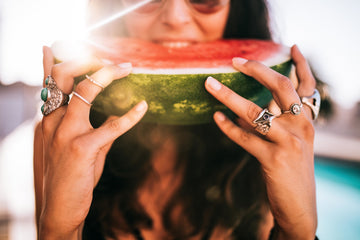We’ve all heard the advice: for glowing skin, drink more water. You carry a water bottle everywhere, you track your ounces, and you dutifully sip all day long. Yet, at the end of a long summer day, you look in the mirror and see skin that looks dull, tired, and lackluster. How can you feel like you’re drowning in water but your skin still feels so thirsty? The truth is, optimal skin hydration is far more complex than simple water intake. It’s a dynamic process involving your skin's ability to attract, bind, and, most importantly, hold onto moisture. This summer, let's dive deeper than the water bottle and explore the science of achieving a truly hydrated, plump, and dewy glow.
The Dehydration Double-Whammy of Summer
Summer presents a unique, two-pronged attack on our skin's hydration levels.
- External Factors: The elements we love most about summer are often the biggest culprits. Sun exposure, drying winds, salty ocean water, and chlorinated pools all work to strip the skin of its natural oils and compromise its protective barrier, allowing precious moisture to escape.
- Internal Factors: What we do to escape the heat can be just as damaging. Constant air conditioning recycles dry air, pulling moisture directly from your skin. At the same time, we naturally sweat more in the heat, leading to a significant loss of water and electrolytes from our bodies. This combination of external stripping and internal depletion is the "dehydration double-whammy" that leads to tired-looking skin. It’s important to distinguish this from dry skin, which is a skin type characterized by a lack of oil production. Dehydrated skin is a condition characterized by a lack of water, and it can affect anyone, even those with oily skin.
The Skin's Moisture Matrix: A Complex System
To understand how to fix dehydration, we first need to understand how the skin holds onto water. It’s not like a simple reservoir. Think of it instead as a complex and intelligent "moisture matrix." This system is primarily governed by the epidermis, your outermost layer of skin.
At the very top is the skin's moisture barrier (or lipid barrier), a wall of dead skin cells and lipids (fats) that keeps moisture in and irritants out. Deeper within the epidermis, skin cells contain a group of substances called Natural Moisturizing Factors (NMFs). These include amino acids, lactic acid, and urea, and their job is to attract and bind water. The star player in this system is hyaluronic acid, a molecule that can hold up to 1,000 times its weight in water, giving the skin its plump, pillowy quality.
But what holds this entire matrix together? The foundation of it all is the dermal layer, which is comprised of about 80% collagen. This dense network of collagen and elastin fibers provides the structural integrity and firmness that supports the epidermis above it. When the collagen framework is strong and dense, the entire moisture matrix functions optimally. When it’s weak or degraded, the structure sags, and its ability to hold onto water is significantly diminished. It’s like a sponge: a new, dense sponge can absorb and hold a lot of water. An old, brittle, and thinning sponge can’t, no matter how much water you pour over it.
How Collagen Supplementation Boosts Hydration from Within
This is where the internal approach becomes so critical. You can apply all the hydrating serums in the world, but if the underlying structure of your skin is weak, you’re fighting an uphill battle. Oral supplementation with hydrolyzed collagen peptides addresses the problem at its foundation.
Scientific studies have demonstrated that consuming collagen peptides can significantly increase skin hydration levels. The mechanism is two-fold. First, as we’ve learned, the peptides provide the direct building blocks for your body to create new collagen, reinforcing the skin’s dermal foundation. A stronger, denser dermis provides better support for the epidermis, improving its overall function. Second, these peptides have been shown to stimulate the production of hyaluronic acid. By boosting both the structural framework and the key water-binding molecules within it, collagen supplementation helps your skin become a more efficient and effective reservoir for moisture.
Your Ultimate Summer Hydration Playbook
Achieving that coveted dewy glow requires a 360-degree approach that combines internal support with smart external care.
- Eat Your Water: Complement your water intake with hydrating foods. Watermelon, cucumber, celery, and strawberries are not only packed with water but also with vitamins and electrolytes that help your body utilize that water more effectively.
- Topical Support: Look for serums and moisturizers containing humectants like hyaluronic acid and glycerin, which draw moisture into the skin. Also, use products with ceramides, which are lipids that help repair and support your skin’s natural barrier.
- Lifestyle Habits: Avoid long, hot showers, which can strip the skin of its natural oils. If you spend a lot of time in air conditioning, consider using a humidifier to add some moisture back into the air.
True, lasting skin hydration isn't a myth—it's a science. It’s about creating a resilient, well-supported system from the inside out. By focusing on strengthening your skin's foundational structure, you empower it to do what it does best: hold onto moisture and glow with health.
Ready to build a better foundation for hydration? Collacine provides a potent 12-gram dose of hydrolyzed collagen in a delicious, convenient snack, helping you boost your skin's moisture-holding capacity from within. Click here to give your skin a drink.


